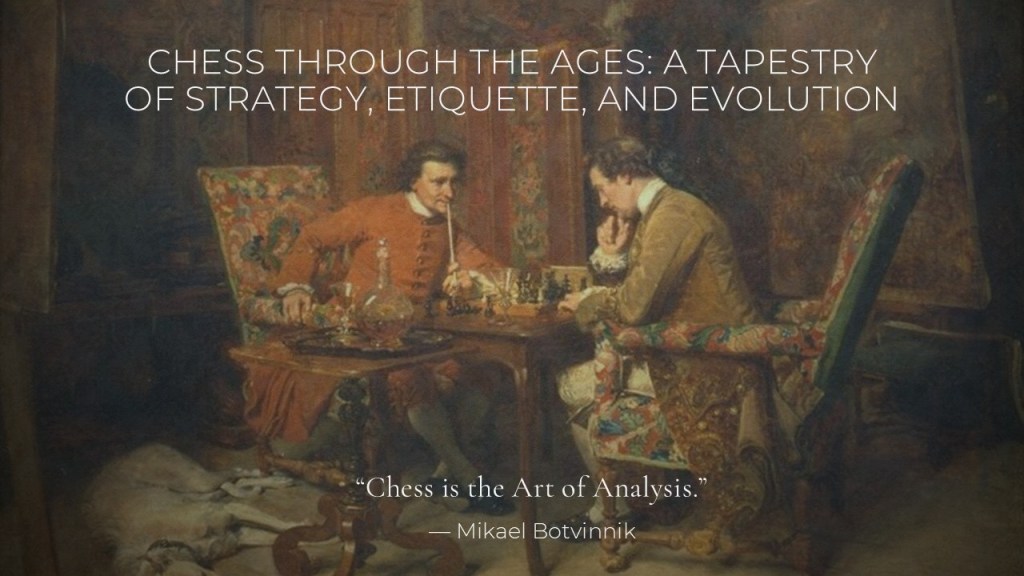Chess Through the Ages: A Tapestry of Strategy, Etiquette, and Evolution

Chess, as chronicled by grandmaster Yuri Lvovich Averbakh (1922-2022) in his enchanting work “A History of Chess, From Chaturanga to the Present Day,” stands as an ancient game with roots in India, spanning nearly fifteen centuries. It emerged during a period when the rulers and elite castes of Indian society sought strategies for warfare, contending with the incursion of Central Asian nomads from the northwest. Referred to as Chaturanga in Hindi, this game evolved into a cultural phenomenon.
Similar to how western civilization inherited from the near east, chess migrated from India to Iran, captivating Persian high society. It served not only as a means of strategic preparation for conflict but also as a method of maintaining control. The Arab conquest of Iran in the 7th century introduced chess to the Arab Caliphate, where it flourished over the next two centuries, garnering the distinction of Shatranj with recognized masters and grandmasters.
By the 9th century, chess found its way to Europe, initially as part of royal education before spreading to commoners. In Russia, influenced by Byzantine traditions, the church initially equated chess with gambling along with other “demonic obsessions.” but failed to halt its popularity. Many Tsars, from Ivan the Terrible to Nicolas II, were avid chess players.

Chess, often regarded as a gentlemen’s game, was historically associated with honour and dignity for the nobility. The game has evolved into a pastime with a rigid etiquette, rooted in respect and civility. Despite occasional lapses in decorum, chess mirrors life, offering insights into individual character through victories, defeats, and the subsequent post-game analyses. The tension and stress inherent in each move create a silent dialogue between opponents, highlighting the mental and intellectual conflict intrinsic to the game.
Chess, with its diverse appeal, attracts individuals with varying motivations—some drawn by a love for games, others seeking distraction or intellectual and creative outlets, and still more enticed by competitive aspirations on both amateur and professional levels. The game reflects life’s dichotomy of setbacks and triumphs, good and bad choices, and the resilience displayed in the face of defeat
Chess players span a spectrum of temperaments. Gracious individuals like Jose Capablanca, Boris Spassky, Lev Aronian, and Viswanathan “Vishy” Anand exemplify gracious sportsmanship, acting as true ambassadors of the sport. Conversely, figures like Alexander Alekhine, Aaron Nimzowitsch, Garry Kasparov, and Viktor Kortchnoi have exhibited less gracious reactions to defeat. Bobby Fisher, though brilliant but self-destructive, displayed despicable behaviour in his historical 1972 match in Reykjavik against Boris Spassky, contributing to a global chess boom during the Cold War.
The evolution of chess, mirroring societal changes, and has seen distinct eras—romantic, classical, and modern—with the advent of computers and artificial intelligence marking a transformative phase. While some argue that AI has contributed to a theoretical focus, potentially detrimental to the essence of practical play, others contend it has elevated competition, pushing players to new heights.
The game’s transformation parallels broader societal shifts, including increased accessibility and the impact of the internet. The anonymity of online interactions has introduced a new dynamic, reflecting a general trend of incivility in daily discourse. This shift is not unique to chess but extends to various aspects of contemporary society and sports.
Addressing the query on Quora about whether chess attracts fewer gentlemen, characterized by rudeness and poor sportsmanship, the answer is nuanced. While the essence of a “gentlemen’s game” may seem diminished, the broader openness of chess to participants from diverse backgrounds mirrors societal changes. The influence of the internet, with its faceless and often uncivil interactions, contributes to this evolving landscape, aligning chess behaviour with wider societal trends.in societal behaviour.
William J J Houtzager, Aka WJJH 17.3.2024
📌Blog Excerpt
Chess, originating in India nearly 15 centuries ago, has evolved alongside society, disseminating from the elite of ancient civilizations to a game appreciated globally today. Although historically considered a ‘gentleman’s game’ emphasizing honour and respect, its societal perception and player behaviour have changed influenced by societal shifts. Despite incivility and lapses in decorum, the game still mirrors life experiences with its setbacks and triumphs, good and bad choices.
One thought